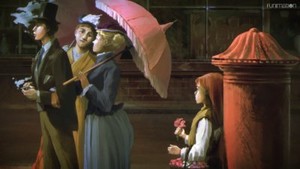Moriarty the Patriot
Episodes 1-2
by Rebecca Silverman,
How would you rate episode 1 of
Moriarty the Patriot ?
Community score: 4.1
How would you rate episode 2 of
Moriarty the Patriot ?
Community score: 4.4

Who is Professor James Moriarty? Not even his original creator, Arthur Conan Doyle, really had a good answer for that. Mostly that's because Conan Doyle created him as a means of killing off Sherlock Holmes at the infamous Reichenbach Falls, but when Holmes' death failed to take, there was some quick retrofitting done in order to include Moriarty in later Holmes stories, including some set before the Reichenbach Falls incident. Unfortunately, Conan Doyle didn't necessarily pay much attention to his own precedent, which means that even canonical information about fiction's Napoleon of Crime (a nickname borrowed from real-life criminal Adam Worth) is both sparse and often contradictory. But Conan Doyle's own patchy record on the character means that there's plenty for later creators to play with, and that sometimes leads to stories like Moriarty the Patriot, adapted from the manga of the same name.
These first two episodes of the show perhaps don't strictly follow the source manga, but it's not hard to see why. Episode two starts the story that begins Ryōsuke Takeuchi's series, which is the true origin of the man who would become known as Professor Moriarty. Since that necessitates a storyline ten to twenty years in the past, when a kind noble lad named Albert Moriarty encountered two orphan siblings in a ragged school, it doesn't necessarily give a good vision of what the series is actually about. Therefore opening with a present-day story about what those three boys are getting up to as wealthy young men really does make a lot of sense – it still lays out the class war that the Moriarty brothers are fighting, but it's illustrated in vivid strokes painted in the blood of the corrupt. Episode two then whisks us back in time so we can see how the whole thing started, because now we know what the story is working towards.
It's perhaps not all that big a surprise, even before we get the sad background of William and Louis, the two boys Albert encounters. After all, if Sherlock Holmes is the great consulting detective, then what can Moriarty be but his opposite, the great criminal? But rather than allowing for him to just be evil for evil's sake (which in all fairness to Conan Doyle was a perfectly reasonable Victorian plot, especially if “evil” could be equated with “not white or Christian”), the show takes it one step further: he's Holmes' perfect opposite not just because he's a criminal, but because he's a consulting criminal, meaning that people go to him for help in committing crimes. Therefore when a tailor's son becomes the latest victim of a nobleman who is going around abducting, abusing, and possibly raping young working and lower class boys, his father turns to the Moriartys to find out how best to dispose of the man who is largely considered untouchable by British law. No one is punished who is not deserving of being stabbed to death with scissors, but it's all taken care of out of the sight of the police, because no one, not the tailor nor the Moriarty brothers, trust the officers of the Queen to do what ought to be done.
Is it melodramatic? Absolutely, but in that very particular way in which Victorian crime fiction is. It's a plot you'd find in a penny dreadful or a sensation novel, but it trades on a system that journalist Henry Mayhew documented in his 1851 work London Living and the London Poor, which is seen in the stills of children living in poverty in episode two. The historical background, especially in episode two, feels very true to the literature of the time – Charles Dickens' A Christmas Carol was written in support of Ragged Schools (free schools for the poor) – and if the attitudes of the Moriarty family barring Albert are overdone for dramatic purposes, they're certainly not that much of an exaggeration; again, you need look no further than Dickens' works. And when Albert realizes that little William James Moriarty, as he will be, is giving a group of men directions on tunneling into a safe owned by a man who steals from the poor and hears him teaching a group of children to rise up in, essentially, the name of liberté, égalité, et fraternité, he seems to come to a decision about what exactly he wants to do with his own privilege…and who should share that privilege with him.
It's a bit of a shame that this isn't entirely period-faithful; women are dressed in the style of 1886 rather than the 1866 date indicated at the start of episode two, for example, but this is still off to a very promising start. Uses of the colors red, gold, and black give the show a striking color scheme and the mystery behind the fire that we see three boys walk out of at the end of the second episode is a good hook to pull us into episode three. They may be budding criminal consultants, but they're certainly living up to the Moriarty family motto: Je crois en moi – “I believe in myself.”
Rating:
Moriarty the Patriot is currently streaming on Funimation.
discuss this in the forum (178 posts) |
this article has been modified since it was originally posted; see change history
back to Moriarty the Patriot
Episode Review homepage / archives